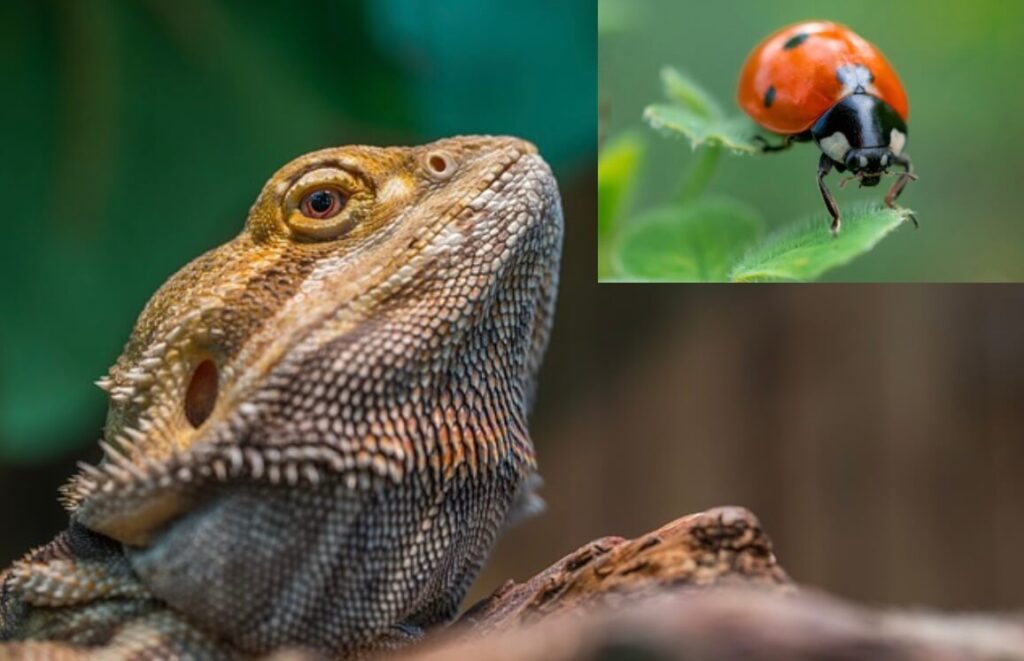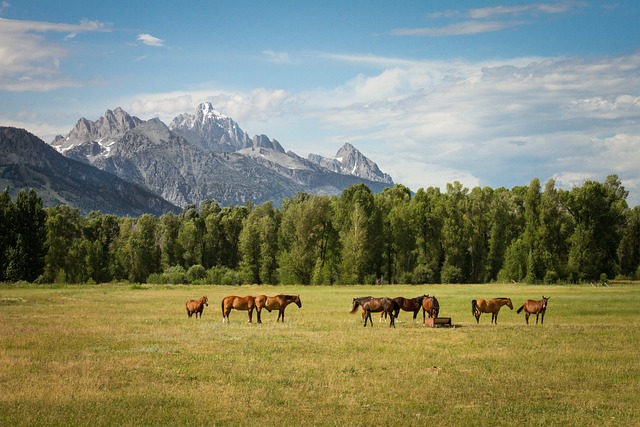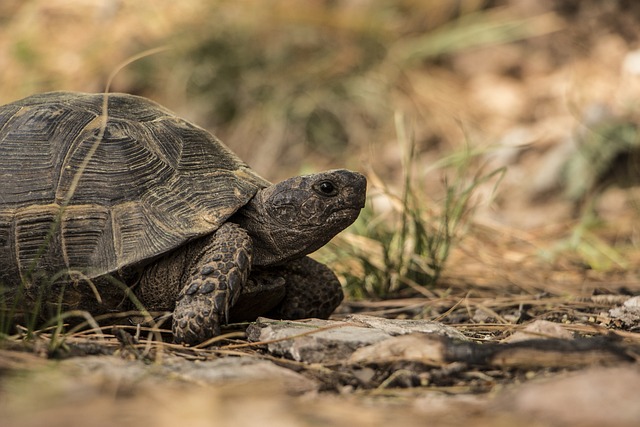If you’re wondering “Can bearded dragons eat ladybugs?” the answer is – probably not. While one or two bearded dragons won’t kill a bearded dragon, they should not eat ladybugs if you can help it.
In this article, we’ll explore the nutritional value of ladybugs for bearded dragons and how to feed them properly. As well, see our full guide to Bugs for bearded dragons.
Can bearded dragons eat ladybugs?
- Can bearded dragons eat ladybugs?
- Ladybugs Nutritional Value for Bearded Dragons:
- How often should you give ladybugs to your beardie?
- Potential risks of feeding ladybugs to your bearded dragon:
- Should I feed my baby bearded dragon ladybugs?
- What to do if your bearded dragon ingests a large amount of ladybugs accidentally?
- Frequently Asked Questions (FAQ): Can bearded dragons eat ladybugs?
- Foods bearded dragons can eat:
- Getting your bearded dragon calcium:
- Vegetables to feed your bearded dragon:
- Insects to feed your bearded dragon:
- How often should you feed a bearded dragon?
- What should a bearded dragon not eat?
- Recap: Can bearded dragons have ladybugs?
Ladybugs Nutritional Value for Bearded Dragons:
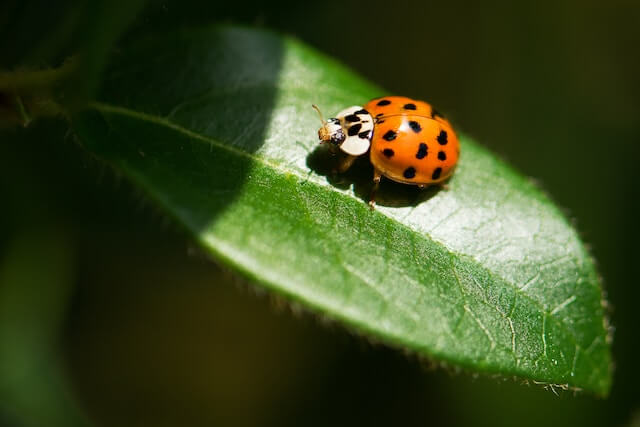
The nutritional value of ladybugs varies greatly depending on the type of bug. There are actually thousands of types of ladybugs with varying body types and toxins. However, all ladybugs contain some protein, fiber, and vitamins.
Ladybugs release poison when they are threatened. The poison comes from their blood, and usually emits an unpleasant odor and leaves behind a red or yellow fluid when you crush the ladybug.
The common ladybug colors often reflect their level of toxicity to bearded dragons:
- Brown ladybugs: these are usually larch ladybugs. They are the least toxic ladybug species.
- Red ladybugs: These ladybugs are slightly more poisonous than brown ladybugs.
- Orange ladybugs: these are usually Asian lady beetles and quite toxic.
- Black ladybugs: these ladybugs with small red spots are called pine ladybugs and highly toxic.
Source: Healthline
In general, if your bearded dragon eats a beetle that is brown or red, it’s less risky than them eating an orange or black ladybug.
How often should you give ladybugs to your beardie?
Ideally, never. Ladybugs can be highly toxic to your bearded dragon so you should not feed them ladybugs willingly.
Potential risks of feeding ladybugs to your bearded dragon:
The poison that ladybugs release can be highly toxic to your bearded dragon. As well, they don’t have a large amount of calcium, despite being full of protein. This could lead to long term calcium deficiency if you were to only feed your bearded dragon ladybugs.
Long term calcium deficiency will cause your dragon to develop brittle bones, causing them pain in their joints and bones. If this condition continues, it could even lead to paralysis in extreme cases.
Should I feed my baby bearded dragon ladybugs?
No. Do not feed your baby or juvenile bearded dragon ladybugs. They can be toxic to adult bearded dragons, much less a growing bearded dragon who doesn’t have a fully formed digestive system.
What to do if your bearded dragon ingests a large amount of ladybugs accidentally?
Don’t panic. Immediately stop your bearded dragon from eating the ladybugs, and closely monitor them closely for symptoms of a strong reaction. This reaction could include:
- Bloating
- Diarrhea
- Vomiting
- Spitting up
- Abnormal behaviors
Give them lots of water to flush out the ladybugs as well as a warm bath to calm them down and to encourage a bowel movement. If the reaction worsens or you’re noticing anything out of the ordinary, call a vet immediately.
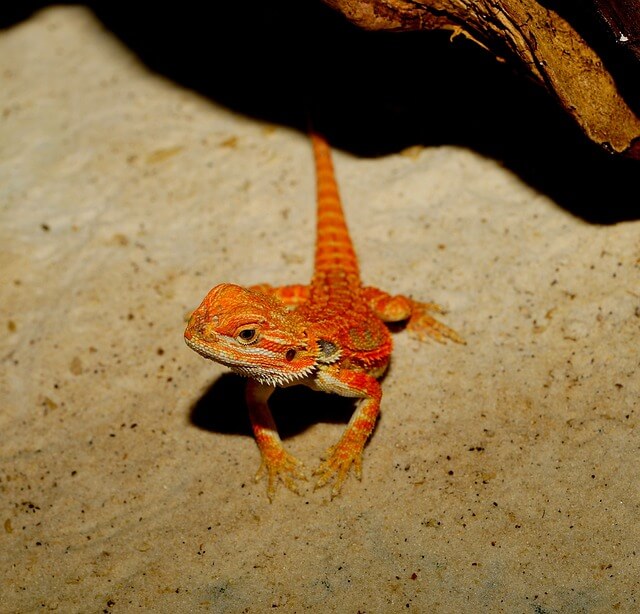
Frequently Asked Questions (FAQ): Can bearded dragons eat ladybugs?
What bugs are poisonous to bearded dragons?
Bearded dragons can not eat any bug that is venomous or that glows (fireflies, lightning bugs, or worms that glow in the dark).
What are the most toxic ladybugs?
Orange ladybugs are highly toxic, as are black ladybugs with red spots.
Can bearded dragons eat grasshoppers?
Yes! Bearded dragons can safely eat grasshoppers. Not only do they find grasshopper delicious, they are high protein and great for growing bearded dragons.
Can bearded dragons eat praying mantis?
Bearded dragons can safely eat praying mantis.
Can bearded dragons eat stink bugs?
Stink bugs can be mildly toxic to bearded dragons. It won’t seriously harm them, but they shouldn’t eat them regularly. Stink bugs are not found in their natural habitats so they aren’t used to digesting them.
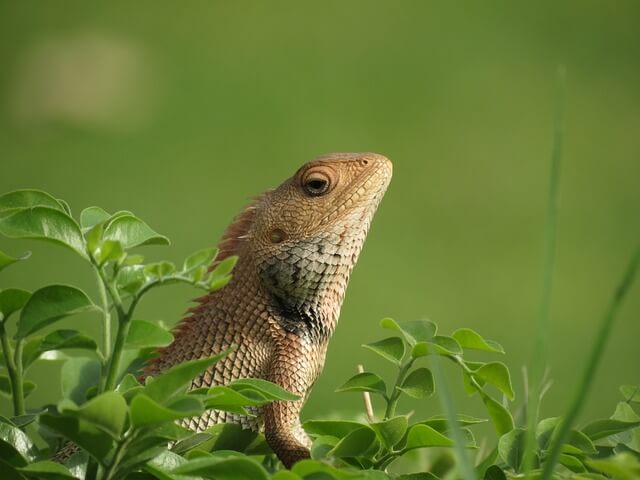
Foods bearded dragons can eat:
If you’re wondering what you should feed a bearded dragon, read our guidelines below. Bearded dragons are insectivores, which just means they thrive on insects as well as plant materials.
If you have a juvenile bearded dragon (between six and eighteen months old), give them about 80% vegetables and 20% live insects.
As your bearded dragon transitions into adulthood, give them the inverse, so 20% plant materials and 80% insects.
Getting your bearded dragon calcium:
Calcium is especially vital to a bearded dragon, especially a young one that is still growing. There are several ways to introduce more calcium into your beardie’s diet:
- Add in more high calcium vegetables like dandelions, bok choy, and collard greens.
- Dust calcium powder over their insects and vegetables to increase calcium levels.
- Make sure they’re getting their 12 hours of UVB exposure as they need this light to be able to properly absorb nutrients.
Vegetables to feed your bearded dragon:
- Peas
- Dandelion
- Green beans
- Cabbage
- Zucchini
- Pumpkin
- See our full list of vegetables to feed your bearded dragon
Note: Bearded dragons can also eat fruit in moderation. See here for a complete list of fruits bearded dragons can eat.
Insects to feed your bearded dragon:
- Crickets
- Kingworms
- Waxworms
- See our full guides to insects you can feed your bearded dragon and worms to feed your bearded dragon
Quick note: Live insects raised by you or bought from the pet store are best because they’re definitely pesticide free.
How often should you feed a bearded dragon?
During the first 3-6 months of your beardie’s life, try to feed them four to five times a day by giving them as many insects as they’d like in 10 minutes. They’re growing and need lots of protein during this stage.
Reduce the number of feedings to about two to three times a day when they’re growing into their juvenile years (between six and eighteen months).
As they become an adult, you can feed them once daily.
What should a bearded dragon not eat?
Avoid feeding your bearded dragon:
- Onions
- Leeks
- Chives
- Mushrooms
- Garlic
- Acidic fruit like oranges, lemons
- Rhubarb (can be toxic to them)
- Avocados (surprisingly, these make them ill)
- Eggplant
- Insects caught in the wild (there may be pesticides covering them)
- Venomous insects
- Dairy of any kind
- Rice and grains of any kind
- Frogs or toads
- Ham or other processed meats
Recap: Can bearded dragons have ladybugs?
- No, bearded dragons can not have ladybugs. They can be poisonous to them.
- Different colored ladybugs have different levels of toxicity. To be safe, never feed them any ladybug, no matter their shell color.
For our full list of food to feed a bearded dragon, see our guide here.
Related articles:

